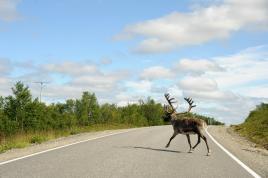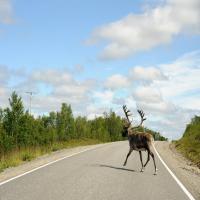FHWA Offers Grants To Reduce Wildlife-related Accidents

Sometimes a simple “Deer X-ing” sign isn’t enough. Vehicle accidents involving wildlife can be very dangerous and sometimes deadly. With that in mind, the Department of Transportation Federal Highway Administration (FHWA) has made grant funding available for a new pilot program aimed at making roads safer, preventing wildlife-vehicle collisions and improving habitat connectivity.
Created through the Infrastructure Investment and Jobs Act (IIJA) (Pub. L. 117-58), the Wildlife Crossing Pilot Program seeks to enable states and communities to construct wildlife crossings over or below busy roads, add warning signs for drivers and acquire wildlife mapping and tracking tools.
“There are proven practices to prevent crashes between vehicles and wildlife, and with this investment, we’re going to take common-sense steps to reduce collisions and make roads safer for rural and urban communities alike,” FHWA Administrator Shailen Bhatt said. “Thanks to [IIJA funding], communities that may not previously have had access to funding for these critical projects can finally make roads safer while protecting wildlife and their movement corridors.”
FHWA estimates that about 200 people are killed – and many more are injured – nationwide in more than a million collisions involving wildlife and vehicles. The pilot program will provide $350 million available over five years, including more than $111 million in grants through its first round of awards funding this year. Grants are available for all project activities, including research, planning, design and construction. The program supports the Department of Transportation’s National Roadway Safety Strategy, which aims to achieve zero roadway deaths and serious injuries through a “safe system approach,” which includes multiple approaches to prevent crashes from happening in the first place.
Eligible applicants include state departments of transportation, metropolitan planning organizations, local governments, regional transportation authorities, special purpose districts, public authorities with a transportation function, Indian tribes, and federal land management agencies that are proposing projects to reduce wildlife vehicle collisions and improve habitat connectivity for terrestrial and aquatic species. Applications must be submitted via Grants.gov no later than 11:59 p.m., Eastern time on Aug. 1.
Join us for our following Thompson Grants events:
Thompson Grants Workshop: Subrecipient Monitoring | May 23, 2023 | Virtual Event
Federal Grants Forum | June 28-30, 2023 | Portland, Maine



